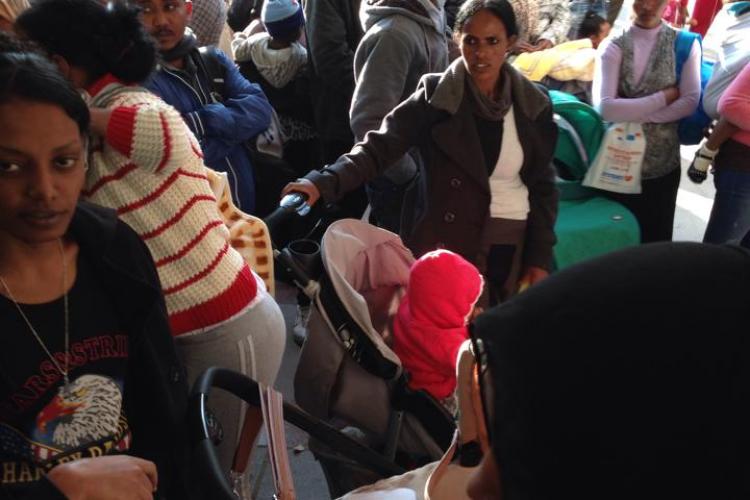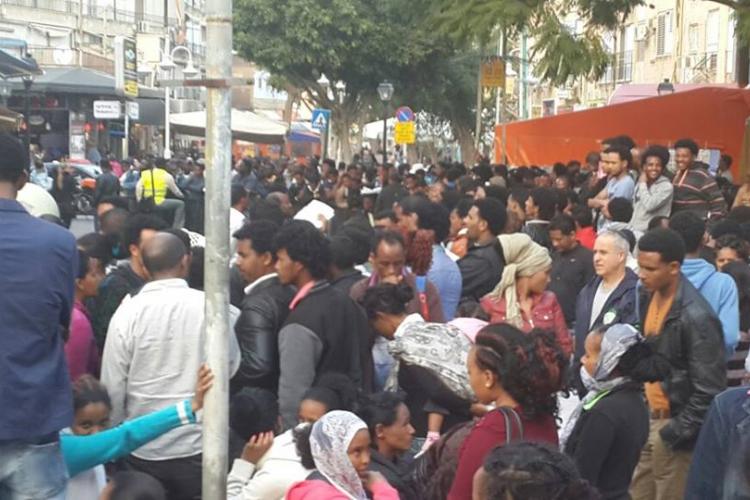Guest post by Sigal Rozen. Sigal is the Public Policy Director at the Hotline for Refugees and Migrants (HRM), an Israeli NGO she helped found with a group of concerned citizens in 1998. Rozen was the Hotline's first director, until 2004 and later served as the spokesperson of the HRM. Over the last 20 years, Rozen has written most of the HRM's reports and shadow reports and represented the HRM in the Israeli Parliament. Rozen holds a BA from Tel Aviv University in English and French literature. This is the fifth instalment of Border Criminologies’ themed series organised by Maayan Ravid on ‘Border Control and the Criminalisation of African Asylum Seekers in Israel’.
The majority of African asylum seekers did not come to Israel for work (table 11), and most of them undertake tremendous efforts to retain legal status in the country. This blogpost examines the efforts of the Israeli Immigration Authority to turn African asylum seekers into ‘illegal infiltrators’ and the methods it has employed over the years.

The Early Years and the Start of Workforce Marginalization
Asylum seekers, who entered Israel in previous years used to appeal to UNHCR, register as asylum seekers, carry UNHCR documents, and work without permits with the silent approval of authorities. With the arrival of the first large group of Darfuri refugees in 2005, asylum seekers were released from initial imprisonment to alternative custody arrangements in Kibbutzim and Moshavim (agricultural communities), following a long struggle by Israeli human rights organizations. In early 2006, authorities began creating barriers to the employment of asylum seekers.
In March 2007, the Ministry of Welfare published general guidelines confirming that employers will not face fines for employing undocumented people. Up until early 2008, UNCHR documents, shown together with these guidelines, enabled asylum seekers to seek and find work easily.
In the first months of 2007, refugees from other parts of Sudan and Eritrea arrived into the country. They waited for military patrols at the border to take them to Ktzi'ot prison, where they expected to meet UNHCR representatives. In September 2007, the first Eritreans were released to alternative custody in Moshavim throughout Israel but it was made clear to them that abandoning their workplaces meant returning to prison. Representatives from the Hotline for Refugees and Migrants (HRM) followed-up on those asylum seekers and discovered that many were employed in slavery-like conditions. As a result, the Immigration Authority released them from Moshavim and ordered them to renew their visas once every month or two at Ministry of Interior offices.
In late 2007, 5,179 African asylum seekers resided in Israel. Due to overcrowding in Ktzio't prison, hundreds of them were released to the streets of South Tel Aviv (table 2, Hebrew). Due to tremendous pressure from American Jewish communities, authorities granted approximately 500 Darfuris temporary residency and another 2000 Eritreans a B1 work permit for half a year. The then Head of the Immigration Authority, Yaakov Ganot, clarified that this status was given on ‘humanitarian grounds.’ In a meeting arranged by Tel Aviv municipality representatives, he urged leaders of asylum seeker communities to assure their comrades who were on the way to Israel, that from this day onward ‘infiltrators’ would not be accepted with forgiveness and understanding. In the decade that has passed since, all Ministers of Interior and Immigration Authority bureaucrats have remained loyal to that statement.

Conditional Release and Constriction of Legal Employment
Since the beginning of 2008, Eritreans and Sudanese nationals who dared to cross into Israel despite the warnings of the Immigration Authority no longer received work permits but a new type of permit: a conditional release document subject to clause 2(a)5 of the Entry to Israel law. This visa means that a deportation order is pending against its holder. However, since it is impossible to deport the holder to his home country, he is conditionally released and free to live in Israel, until it will be possible to deport him.
In June 2008, the 2,000 Eritreans who were holding B1 work permits, were required to renew their visas. However, they found closed doors at various offices of the Ministry of Interior. One after the other, they lost their jobs, as their employers feared fines for employing them without permit. In August 2008, 400 asylum seekers arrived in the Immigration Authority office in Lod, hoping they could get their jobs back. They were granted a 2(a)5 conditional release visa instead of a work permit upon geographical restriction: not to reside or work in the main part of Israel, between two cities - Hadera and Gedera. The community's leaders resisted, and demanded work permits. An Interior Ministry official threatened that all those not complying would be arrested, and refused to grant even the limiting conditional release visas to three of the community leaders.
Visa Offices
Initially, visa extension services were provided in 24 different Interior Ministry offices throughout the country. In December 2013, the number of offices was reduced, as were the hours of service. Only four offices remained open for asylum seekers, for two and a half hours at a time, twice a week.
Immigration Authority did not notify of the closing and opening of the various offices. 50,000 asylum seekers who resided in Israel at the time, were left to wander the land in search of an office where they could, despite monstrous queues, enter and renew their visa. By the end of 2014, 41,000 Eritreans and Sudanese who remained in Israel were forced to compete over the opening times of only three offices: Tel Aviv, Beer Sheba, and Eilat. In June 2017, the Immigration Authority shut down its Beer Sheba office and left 37,885 asylum seekers with only two offices where they could renew their visas: Bnei Brak office, opens five days a week; and the Eilat office, open two hours each Thursday and Wednesday. An appeal by the HRM demanding the Beer Sheba office to stay open was rejected by the High Court (HCJ 4284/17 HRM vs. The Minister of Interior).

An Entrapment Policy
Alongside the reduction in the number of offices, Immigration Authority also cut down visa lifespans. Visas extended for two months or less require waiting in line for days and nights. Additionally, despite a ruling mandating conditional release visas to every migrant upon release from custody (Administrative Appeal 6848-08-12 HRM and al. vs. PIBA), the Immigration Authority conditions the granting of visas upon an ever-growing list of demands. Asylum seekers must present documents such as rent contracts and salary slips that they do not always have; birth certificates for their children despite difficulties posed by the Interior Ministry to prove parentage; invasive and humiliating interrogation of asylum seekers who say they are married; and many more.
At the beginning of March 2018, immigration officers spread rumors that even ‘infiltrators’ who did not renew visas for long periods of time can now be granted visas. Activists translated the information to Tigrinya and thousands of asylum seekers from all around the country left their working places and arrived at Bnei Brak Immigration office to stand again, in monstrous lines for the desired conditional release status. During three months, thousands of asylum seekers arrived there daily with the hope to renew their visa. They stood for long hours in the rain and hot sun, in long lines arranged by their community representatives. The authorities blamed the asylum seekers for the long queues.
According to a border control officer at Bney Brak, the office can take in 1,000 asylum seekers a day, an insufficient amount even if functioning perfectly. During the three months, the office was closed for several hours each day, or entire days, due to overcrowding. On most days, no more than 400 asylum seekers managed to squeeze their way in and receive a visa, oftentimes together with a deportation order to Rwanda. Volunteers who attempted to assist asylum seekers in the long queues reported that Israeli citizens, and even lawyers, were charging money for getting asylum seekers into the office for a visa. More and more asylum seekers paid money for forged visas.
The HRM received many calls from asylum seekers who remained jobless and homeless after leaving their work place, not being able to travel back and forth every day due to expensive transportation fees. The Sharet Police station commander, in a meeting with human rights organisations representatives, identified that the crime rate among Eritreans rose due to growing homelessness over the last months. During all these years, Immigration Authority propaganda consistently states ‘if it's not legal – it doesn't work’, instilling fear into every Israeli employer's heart until they refuse to employ migrants who do not hold valid visas. In June, in response to a legal proceeding submitted by the HRM, the immigration authority started allocating more of its 30 officers to visa renewal offices and also declared they would receive visa renewals according to specific hours, by invitation.
The various pressure methods cited above led to a great decrease in the number of asylum seekers renewing their visa, and an increase in those working without a valid visa. Immigration authority policies and decrees created a situation where, despite tremendous efforts, asylum seekers in Israel find themselves residing and working unlawfully, forced to pay bribes, fake visas, and even engage in criminal activities just to survive.
Any comments about this post? Get in touch with us! Send us an email, or post a comment here or on Facebook. You can also tweet us.
__________
How to cite this blog post (Harvard style)
Rozen, S. (2018) A Criminalizing Visa Regime. Available at: https://www.law.ox.ac.uk/research-subject-groups/centre-criminology/centreborder-criminologies/blog/2018/10/criminalizing (Accessed [date]).
Share:








